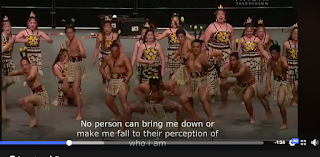Decolonizing research might mean a new research pardigm
I've been plowing through Chilisa'a Indigenous Research Methods. It is a slog. There is a lot of nomenclature that is new to me and some ideas that are challenging me. The challenge is not in the way I might have expected. I am feeling really removed from a lot of what the author is writing about. The closest I have felt a connection to the ideas of post colonial indigenous research is the experience i have when I am doing research for hula and I find myself so often referring to sources that are post-Cook. These sources are translating or interpreting historical cultural material through the Euro-Western lens. The translation of place names are not routed in generations of ancestral connection. Even when sources such as David Malo (born before western arrival in HI but Protestant missionary educated) are consulted the voice is lacking something true, something authentic.
The answer may be to dig deeper into the source material. My Hawaiian language skills are conversational not research-ready. When I go to the microfilms of original Hawaiian language newspapers I need to keep the Pukui dictionary with its comforting diacritical marks at one hand and a detailed map of the are in question in the other.
Perhaps, my entire method is backwards. As Chilisa suggests, there is a need to decolonize the Western research methodologies. Rather than research the place and people of the hula I ma studying through written resources, perhaps I should approach from a Hawaiian perspective and go to the place. Feel the wind, breath the air, walk and swim the 'aina of the place, of the person. These are the cultural practices of kilo that are the key some new perspective on values, thinking, techniques from a perspective outside of the colonizer.
In halau, we are encourged to use all the resources at our disposal for research. Our task is to know the hula as the one who wrote it knows.knew the hula. Surely personal experience is preferred. Discussion with someone who has experience in that place or with the life of the composer is a rare and valued asset. Often now, we turn to written accounts. Perhaps we are lucky enough to come across a transcript of an interview. If someone before us had the accurate foresight, that transcript may be in 'oleo Hawai'i where the language serves to reveal aspects of cultural knowledge that English can never approximate.
I find some important direction in Chilisa's citation of one of Linda Smith's (1999) suggested strategies for decolonizing- deconstruction and reconstruction. The author describes a process where the researcher destroys what has been written- to remove the culturally deficient models that pathologized the colonized- and then works to rebuild the stories of the past through positive labelling and life experience and culturally accurate and celebratory accounts.
I am still experiencing these ideas through the reading over the recent experience of Keli'ikoa Kaeo's stand to use his own native language to explain himself in a state court over a charge of trespass on traditional cultural lands. Witnessing that event and the outcry of public support made me wonder if a moment of honest reflection might happen on the part of the Other (State if HI) and the colonized (Hawaiians and other residents who can make a commitment to learn and use 'olelo Hawai'i) It is work. It requires moe than just noting how the language was criminalized and removed from the lives of everyday people. It requires mourning the loss of 'Olelo in every day and every place and all of the subtle nuances that are a part of spoken language but fade in "book-learned" language. We have to do something. We have to do what we can do. The cultural stand needs the vibrancy and strength of the language behind it.
If there was any doubt about this, take a look at this powerful position of defiance and pride from a group of young Maori... (photo at top of post)
https://www.facebook.com/kaitaniwha.mauri.3/videos/136567483754264/?q=la%27akea%20kaufman

Your research, reading, and experiences are all blending... and the realizations are difficult to fathom sometimes. I commend your honesty and how you openly share your struggles. I appreciate your willingness to acknowledge and seek the understandings based on the Hawaiian host culture of this place we call home. Keep seeking your path...
ReplyDelete